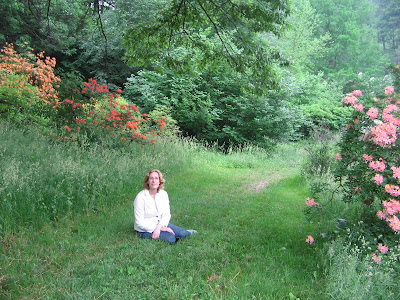With this bout of asthma, I am grateful that I actually have not lost my singing voice. Two years ago I did, right before a concert, and was worried I wouldn’t be able to even speak to announce that I wouldn’t be singing. I did hobble through the program though, having not been able to phonate for days.
After about two months of my current lung woes, my cough is finally going away; I was even able to exercise for the first time in many weeks, taking deep breaths and scampering on the elliptical machine as if I were born to it. But my singing has not come easily this semester though, thanks to the asthma, (which made my voice respond as flexibly as a rusty tool) and to my airhead teacher, whose unprofessionalism and slim advice left me with little to learn from.
(An aside: I once lost my speaking voice some 10 years ago, before I started singing. I was playing in the orchestra for a summer stock company on Cape Cod, performing nine shows in 10 weeks, rehearsing in the morning and playing in the evening six days a week (two shows on Thursdays). Sniffles ran quickly through our close quarters in the inn (the room I shared with six other girls was nicknamed The Orphanage), and my cough turned inexplicably to laryngitis. It was awesome. My horn playing took on new dimensions, as, having no other alternative, my instrument became my voice.
After Rome, that was the best summer of my life. It was music theater boot camp, but spending every afternoon on the beach, hanging out with clean-cut, all-American, chipper young performers, and playing music does not constitute torture. When I arrived I was just beginning to do damage control from an evil relationship that had ended months before, and I came to the Cape renouncing men.
“Where will you be living?” A friend had asked.
“All together in one big house that’s a stroll away from the beach.”
“Just how many seconds will it take before you hook up with someone?” She demanded.
Touché, my friend. My sourpuss feelings evaporated when I walked into the inn’s lounge, (looking cute, I imagine, in my white sundress with the flowers and butterflies) and met THE four cutest guys in the company: a blonde, a redhead and two brunettes, this being a music theater troupe after all. Without thinking, I slipped into my goofball, all-smiles routine. “You know that new horn player?” Said the blonde, as was later reported to me by the redhead. “She’s mine!”
But my memory brings to mind that flame-colored hair, endless ivory skin and, on one occasion, a walk on the nighttime beach, which was illuminated with purple flashes from a distant storm. We returned to the inn, and I struggled to scrape the sand out of my hair as we stopped in the yard to chat and watch the rabbits in the grass. “You are… breathtakingly beautiful,” his baritone voice soothed, but I was the one who was breathless. (Freak out not, Mom and Dad, there are no more details than that to divulge.) But I digress. I digress, I digress.)
Back to the present time.
During this busy month of illness and performances, ill-supported by a shapeless voice teacher, I felt that I couldn’t keep up vocally. I had time to learn the pieces, pretty much, but not work them into my voice, so my concerts felt ill-prepared. As with exercise, I am now easing myself back into practice, singing at length and gently trying to acclimate the muscles. The first few days of this process are rather squawky.
But I also feel that I have little grip on my written “voice.”
“Why don’t you write fiction?” A new companion has asked. The ability to create something from absolutely nothing is to me what the ability to sing is to some people: a divine anointment bestowed on only the few, those heavenly beings resembling angels more than men. I realize that fiction and poetry writers are as much a dime-a-dozen as singers are, but truly, I’m fairly certain I am not capable of creative writing.
As a musician, I am an interpretive artist. Put the finished work before me and I can bring it to life. In the orchestra, this involves matching your articulation to the rest of the section, deciding how a Mozart sforzando should be different from the same marking in Wagner, and above all, following the man with the stick. In opera, it’s about singing an aria louder, higher, and presumably more beautiful than the thousands of singers who have sung the same piece before you. For early music, which challenges performers to compose and improvise as much as jazz musicians, you must learn the vernacular of ornamentation in different national styles and time periods: embellishments for an early 17th century French song are very different than an Italian song form the same time. The English and Germans are different too, but what about the German composer who studied in Rome? Or an 18th century composer writing in the “ancient” style? But the many rules you need to follow actually give you more choices, and before you know it you have enough colors on your palate to make the piece your own.
Yet it’s not creativity. It’s assembling data and reshuffling pieces. I can only take the same approach when I “ornament” with words. I take my stories, find mellifluous ways of expressing them, and put them on the page. This summer, where walking through the Roman cityscape made my days seem like waking dreams, my stories wrote and embellished themselves. Here with the Puritans, I’ve had less material for inspiration, but no matter where I am in the world I cannot venture out of my reality. The obvious result of this is that I will simply run out of material someday; maybe then I will have the courage to use my imagination.
Writing this now, I feel my ideas rise, smolder, and vanish before they get to the page. Perhaps if I had a more creative sense, my writing would develop on its own, become a different universe from my narrow reality, teaching me new ideas and adding depth to my feelings. Perhaps. Maybe I'm just suffering from blog depression: http://www.thenonist.com/downloads/thenonist_blog_depression.pdf
I would like to end this discourse with a concise, elliptical, and deeply beautiful couplet that summarizes my thoughts and brings a tear to the eye. I wish I could, but I don’t know how.
Like many people, I started blogging out of an urgent need to procrastinate. -- Alex Ross
Eccomi qua!

Would you like anything to read?
- America's FInest News Source
- The Cutest Thing in The World
- So You'd Like to Build Your Own Harpsichord?
- Quakers and Indians
- All in One Basket
- 5 Tibetans Walk Into a Bar...
- Italian Etimology- very helpful
- Sexy Audrey's Hot Job!
- Early Music Continues
- Ciao
- I Love This Man!
- The Times Dining Section
- Bruni on Bruni
- Someone Else on Bruni
- Cure the Blogger Blues
- A Child's Christmas in Wales
